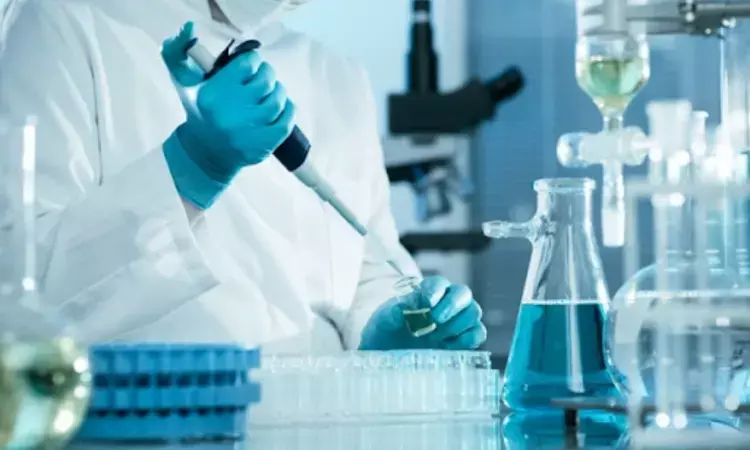- Home
- Medical news & Guidelines
- Anesthesiology
- Cardiology and CTVS
- Critical Care
- Dentistry
- Dermatology
- Diabetes and Endocrinology
- ENT
- Gastroenterology
- Medicine
- Nephrology
- Neurology
- Obstretics-Gynaecology
- Oncology
- Ophthalmology
- Orthopaedics
- Pediatrics-Neonatology
- Psychiatry
- Pulmonology
- Radiology
- Surgery
- Urology
- Laboratory Medicine
- Diet
- Nursing
- Paramedical
- Physiotherapy
- Health news
- Fact Check
- Bone Health Fact Check
- Brain Health Fact Check
- Cancer Related Fact Check
- Child Care Fact Check
- Dental and oral health fact check
- Diabetes and metabolic health fact check
- Diet and Nutrition Fact Check
- Eye and ENT Care Fact Check
- Fitness fact check
- Gut health fact check
- Heart health fact check
- Kidney health fact check
- Medical education fact check
- Men's health fact check
- Respiratory fact check
- Skin and hair care fact check
- Vaccine and Immunization fact check
- Women's health fact check
- AYUSH
- State News
- Andaman and Nicobar Islands
- Andhra Pradesh
- Arunachal Pradesh
- Assam
- Bihar
- Chandigarh
- Chattisgarh
- Dadra and Nagar Haveli
- Daman and Diu
- Delhi
- Goa
- Gujarat
- Haryana
- Himachal Pradesh
- Jammu & Kashmir
- Jharkhand
- Karnataka
- Kerala
- Ladakh
- Lakshadweep
- Madhya Pradesh
- Maharashtra
- Manipur
- Meghalaya
- Mizoram
- Nagaland
- Odisha
- Puducherry
- Punjab
- Rajasthan
- Sikkim
- Tamil Nadu
- Telangana
- Tripura
- Uttar Pradesh
- Uttrakhand
- West Bengal
- Medical Education
- Industry
New study discovers a novel technique for glucose delivery

In a new study, published in the Journal of the American Chemical Society, the traditional use of glucagon is preferred as a preventive measure than its previous emergency use.
Nature achieves remarkable function from the formation of transient, nonequilibrium materials realized through continuous energy input. The role of enzymes in catalysing chemical transformations to drive such processes, often as part of stimuli-directed signalling governs both material formation and lifetime.
In this study a group of researchers from U.S.A demonstrate how they successfully developed hydrogels that remain intact in the presence of glucose but slowly destabilize as levels drop, releasing glucagon into the system, raising glucose levels.
The researchers found that as compared to traditional glucose-responsive materials, which typically engineer degradation to release insulin under high-glucose conditions, the transient nano fibrillar hydrogel materials here get stabilized in the presence of glucose but destabilized under conditions of limited glucose to release encapsulated glucagon.
In the context of blood glucose control, glucagon offers a key antagonist to insulin in responding to hypoglycemia by signalling the release of glucose stored in tissues so as to restore normal blood glucose levels. Accordingly, these materials are evaluated in a prophylactic capacity in diabetic mice to release glucagon in response to a sudden drop in blood glucose brought on by an insulin overdose. Delivery of glucagon using glucose-fueled nano fibrillar hydrogels succeeds in limiting the onset and severity of hypoglycemia in mice.
According to the researchers, the gels should be taken every evening before bed to receive the best protection. The team has stressed that the research is in the very early stages.
This general strategy points to a new paradigm in glucose-responsive materials, leveraging glucose as a stabilizing cue for responsive glucagon delivery in combating hypoglycemia.
Moreover, compared to most fundamental reports achieving nonequilibrium and/or fueled classes of materials, this new investigation offers a rare functional example using a disease-relevant fuel to drive the deployment of a therapeutic.
Reference:
Glucose-Fueled Peptide Assembly: Glucagon Delivery via Enzymatic Actuation by Yu S et. al published in the Journal of the American Chemical Society
https://doi.org/10.1021/jacs.1c04570
Dr. Shravani Dali has completed her BDS from Pravara institute of medical sciences, loni. Following which she extensively worked in the healthcare sector for 2+ years. She has been actively involved in writing blogs in field of health and wellness. Currently she is pursuing her Masters of public health-health administration from Tata institute of social sciences. She can be contacted at editorial@medicaldialogues.in.
Dr Kamal Kant Kohli-MBBS, DTCD- a chest specialist with more than 30 years of practice and a flair for writing clinical articles, Dr Kamal Kant Kohli joined Medical Dialogues as a Chief Editor of Medical News. Besides writing articles, as an editor, he proofreads and verifies all the medical content published on Medical Dialogues including those coming from journals, studies,medical conferences,guidelines etc. Email: drkohli@medicaldialogues.in. Contact no. 011-43720751


